As usual, my reading life in 2009 was split into comics, which I read voraciously and with a eye toward timeliness, and everything else, which I read haphazardly and with an eye toward pleasure. Start with the everything else.
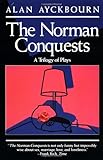 Plans to review the Broadway production of Alan Ayckbourn’s The Norman Conquests sent me to my old copy of the plays, still battered from when, in college, I tried to convince a theater company to let me direct a cast of undergrads in a farcical British trilogy starring a middle-aged British sexaholic. Thankfully for everyone, I was turned down, but re-reading the plays again was a pleasure. In performance, Ayckbourn’s dialogue and construction seem effortless, but on the page, you can tease out the keen sense of narrative that makes these plays so satisfying.
Plans to review the Broadway production of Alan Ayckbourn’s The Norman Conquests sent me to my old copy of the plays, still battered from when, in college, I tried to convince a theater company to let me direct a cast of undergrads in a farcical British trilogy starring a middle-aged British sexaholic. Thankfully for everyone, I was turned down, but re-reading the plays again was a pleasure. In performance, Ayckbourn’s dialogue and construction seem effortless, but on the page, you can tease out the keen sense of narrative that makes these plays so satisfying.
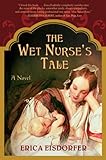 My first real job was at the Bull’s Head Bookshop in Chapel Hill, just after I graduated from that college, and my boss — Erica Eisdorfer, still to this day the best boss I’ve ever had — released her first novel this year, The Wet Nurse’s Tale. I am happy to report that it is great: funny and rousing and just a little bit sexy, despite all that nursing going on. Susan Rose, the novel’s earthy, determined heroine, sets herself apart from other costume-drama heroines with her first words, bellowed out while delivering her first baby: “It’s like shitting a pumpkin, it is!”
My first real job was at the Bull’s Head Bookshop in Chapel Hill, just after I graduated from that college, and my boss — Erica Eisdorfer, still to this day the best boss I’ve ever had — released her first novel this year, The Wet Nurse’s Tale. I am happy to report that it is great: funny and rousing and just a little bit sexy, despite all that nursing going on. Susan Rose, the novel’s earthy, determined heroine, sets herself apart from other costume-drama heroines with her first words, bellowed out while delivering her first baby: “It’s like shitting a pumpkin, it is!”
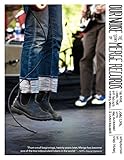 The years I was living in Chapel Hill were the peak of the indie-rock bumrush the local music scene received in the wake of the town being declared “the next Seattle.” (I remained mostly unaware of the frenzy, happily reading books and putting on plays.) But Our Noise:The Story of Merge Records, a big, lively, comprehensive oral history by John Cook, Mac McCaughan, and Laura Ballance, tells the story of how one small local record company managed to withstand the tidal wave of big-label attention and focus for twenty years on what it did best: 1) Putting out albums by great bands like Superchunk, Neutral Milk Hotel, Spoon, and the Magnetic Fields, and 2) Not being assholes.
The years I was living in Chapel Hill were the peak of the indie-rock bumrush the local music scene received in the wake of the town being declared “the next Seattle.” (I remained mostly unaware of the frenzy, happily reading books and putting on plays.) But Our Noise:The Story of Merge Records, a big, lively, comprehensive oral history by John Cook, Mac McCaughan, and Laura Ballance, tells the story of how one small local record company managed to withstand the tidal wave of big-label attention and focus for twenty years on what it did best: 1) Putting out albums by great bands like Superchunk, Neutral Milk Hotel, Spoon, and the Magnetic Fields, and 2) Not being assholes.
 Our four-year-old has very specific tastes in books, and each night picks a title out of a rotation of maybe ten, total, that we read over and over and over. A lot of the books do not hold up to rereading if you are not four: Purplicious, for example, is no Pinkalicious. But a hand-me-down from my old bookshelf, Richard Scarry’s Favorite Storybook Ever, is so packed with detail and charm that it never gets old, and for that I’m grateful to Scarry and his anthropomorphic animals (and their bananamobiles).
Our four-year-old has very specific tastes in books, and each night picks a title out of a rotation of maybe ten, total, that we read over and over and over. A lot of the books do not hold up to rereading if you are not four: Purplicious, for example, is no Pinkalicious. But a hand-me-down from my old bookshelf, Richard Scarry’s Favorite Storybook Ever, is so packed with detail and charm that it never gets old, and for that I’m grateful to Scarry and his anthropomorphic animals (and their bananamobiles).
 Now, comics. For anyone who reads and writes about graphic novels, the year’s big dog was Asterios Polyp, David Mazzucchelli’s long-awaited story of a New York architect whose buildings have never been made and his desperate journey into Middle America. And it was as good as advertised: intricate, funny, lovely to look at, and as carefully assembled a comic as I’ve ever seen. I hope Mazzucchelli doesn’t take ten years to make his next book, but I’m grateful that the ten years it took him to create this one were well-spent.
Now, comics. For anyone who reads and writes about graphic novels, the year’s big dog was Asterios Polyp, David Mazzucchelli’s long-awaited story of a New York architect whose buildings have never been made and his desperate journey into Middle America. And it was as good as advertised: intricate, funny, lovely to look at, and as carefully assembled a comic as I’ve ever seen. I hope Mazzucchelli doesn’t take ten years to make his next book, but I’m grateful that the ten years it took him to create this one were well-spent.
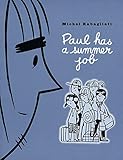 An autumn trip to Montreal led me to a number of the city’s great comics stores, where awesome Francophone bandes desinées line the shelves, making me wish I still remembered my AP French. At Librarie Drawn + Quarterly in Mile End — the bookshop run by Montreal’s terrific art-comics publisher — I picked up the one of Michel Rabagliati’s series of autobiographical comics that I hadn’t yet read, Paul Has a Summer Job, and devoured it that night in our hotel room. Like all of Rabagliati’s books, it takes the quotidian details of life — in this case, a summer spent as an underqualified counselor at a Quebec camp for underprivileged kids — and transforms them into lovely, perfect stories. Bonus points for the most touching ending I’ve read in years.
An autumn trip to Montreal led me to a number of the city’s great comics stores, where awesome Francophone bandes desinées line the shelves, making me wish I still remembered my AP French. At Librarie Drawn + Quarterly in Mile End — the bookshop run by Montreal’s terrific art-comics publisher — I picked up the one of Michel Rabagliati’s series of autobiographical comics that I hadn’t yet read, Paul Has a Summer Job, and devoured it that night in our hotel room. Like all of Rabagliati’s books, it takes the quotidian details of life — in this case, a summer spent as an underqualified counselor at a Quebec camp for underprivileged kids — and transforms them into lovely, perfect stories. Bonus points for the most touching ending I’ve read in years.
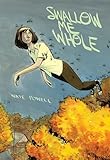 Although it was nominated for an LA Times Book Prize, Nate Powell’s Swallow Me Whole flew under the radar a little bit; it was officially published by Top Shelf last year but (due to shipping problems) not actually in stores until the winter. It’s a wildly imaginative and thoughtful story of two stepsiblings linked by affection and incipient schizophrenia, pushing against the doctors and loved ones who only want to help them. Powell vividly draws swarms of cicadas, talking elves, and grumpy pills with teeth, but at the heart of this gorgeous story are two teenagers trying to work out when everything will finally get better — just like we all felt once. It was my favorite book of the year.
Although it was nominated for an LA Times Book Prize, Nate Powell’s Swallow Me Whole flew under the radar a little bit; it was officially published by Top Shelf last year but (due to shipping problems) not actually in stores until the winter. It’s a wildly imaginative and thoughtful story of two stepsiblings linked by affection and incipient schizophrenia, pushing against the doctors and loved ones who only want to help them. Powell vividly draws swarms of cicadas, talking elves, and grumpy pills with teeth, but at the heart of this gorgeous story are two teenagers trying to work out when everything will finally get better — just like we all felt once. It was my favorite book of the year.








